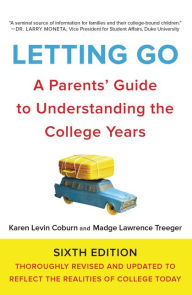Coburn takes questions from real parents about life on a college campus.
Don’t tell your kids, “These are the best years of your life.”
Do teach your kids how to do the laundry, manage a budget and make a medical appointment before they leave for college.

These are among the many practical tips offered in “Letting Go: A Parents’ Guide to
Understanding the College Years” by Karen Levin Coburn, a 30-year higher education veteran and senior consultant in residence at Washington University in St. Louis.
Now in its sixth edition, the book gives parents an insider’s look at college life and helps them navigate the complex emotions both they and their child will experience during this transition and the years that follow.
“Almost every parent will experience some anxiety sending a child to college,” Coburn said. “In addition to the timeless worries — ‘Will my child succeed academically? Will my child fit in?’ — there are heightened concerns today about sexual assault, campus safety and rising tuition.”
 Coburn admits the name of her book may be misleading. “As parents, we never completely ‘let go,’” Coburn said. “The question is how do we find a balance between staying connected and promoting our child’s evolving independence? We can stay connected in ways that are positive, or ways that get in the way of our our child’s growth.”
Coburn admits the name of her book may be misleading. “As parents, we never completely ‘let go,’” Coburn said. “The question is how do we find a balance between staying connected and promoting our child’s evolving independence? We can stay connected in ways that are positive, or ways that get in the way of our our child’s growth.”
The consequences for our children are huge, Coburn said.
“Today’s employers, no matter their sector or size, value problem solvers,” Coburn said. “A college education can prepare our children for the workforce, but parents also play a vital role in raising independent, resilient adults.”
Coburn’s ‘do’s and don’ts’ for today’s parents
Do recognize this is a time of ambivalence for all parents.
The excitement and joy about opportunities awaiting your child are mixed with waves of nostalgia and a sense of loss. Talk with other parents who are going through the same thing.
Don’t tell your child, “These are the best years of your life.”
No one is happy all the time. When a student is homesick, or overtired from studying all night, or a romantic relationship has just fallen apart, it’s not reassuring to have parents imply that this is as good as it gets.
Do discuss academic goals and expectations ahead of time.
Remember, many first-year students do not do as well academically in their first semester of college as they did in high school, and many change their minds about their proposed course of study.
Don’t try to solve your child’s problems.
Encourage your child to use the appropriate campus resources, whether that means an adviser, professor, health services caregiver or career center professional.
Do send care packages.
Cookies, treats, even everyday necessities such as shampoo and toothpaste are reminders that say, “I’m thinking of you.”
Don’t expect a response to every text.
A cell phone can be a wonderful way to keep in touch, but don’t make it, as one student described, an “electronic leash.”
Do take comfort in the knowledge that part of you is going with your child.
The foundation you have provided over the past 18 years will accompany your child across the miles and throughout the years.
Editor’s note: Media may contact Coburn directly at coburn@wustl.edu